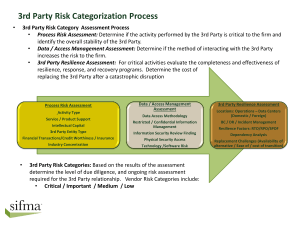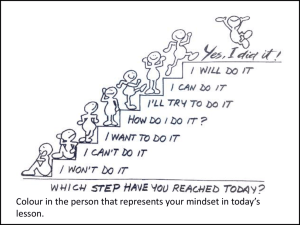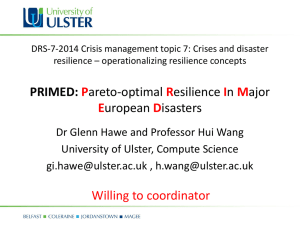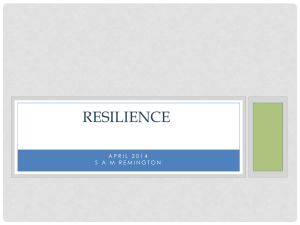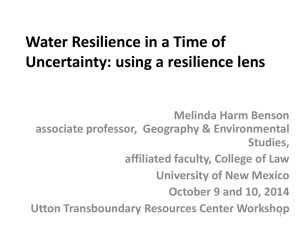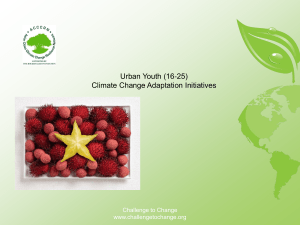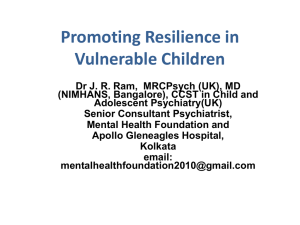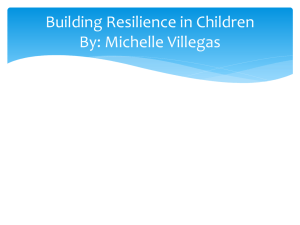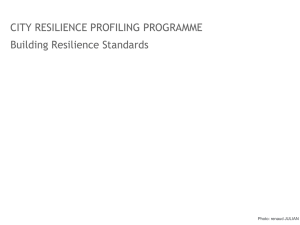Resilience Response Shift
advertisement
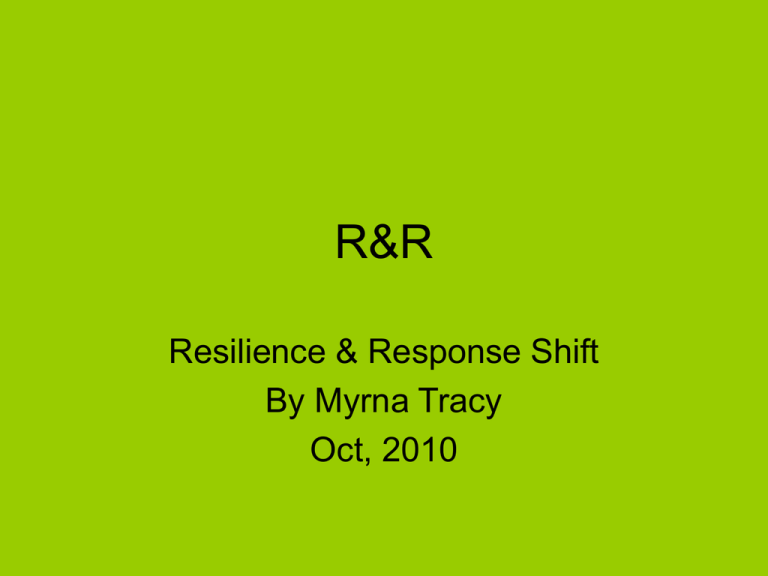
R&R Resilience & Response Shift By Myrna Tracy Oct, 2010 Resilience Resilience A person’s capacity to negotiate stressful events to promote adaptation and psychological growth. Factors: • Positive disposition and temperament attributes Family support Practical support Resilience Scale • For Resilience Scale, see: • Wagnild, GM & Young, HM. “Development and psychometric evaluation of the resilience scale”. Journal Nursing Measures, V1, pp. 165-178 (from Strauss, et. al., 2007). Response Shift What does it mean? Response shift occurs as part of the adjustment process in that people are able to change their priorities and expectations so that they come into line with their changed circumstances. “The Moving Target” Response Shift Model On Being Positive How to help? • Discussion re: preferred type of support, who can provide it & how to get it • Discuss feelings of inadequacy & alienation • Reinforce experiences where others have been available & trustworthy How to help continued • Provide opportunity to consider positive effects of crisis • Expand coping repertoire • Discuss how illness is viewed in terms of controllability • Explore family support How to help continued • Focus on positive areas of life & set goals in areas that are valued and going well • Provide information about how life will be during & after treatment • Use externalization and re-internalization Response Shift Model Social Comparison Theory More info… • Taylor, Shelley & Lobel, Marci. “Social Comparison activity under threat: Downward evaluation and upward contacts”. Psychological Review, V96 (4), 1989, pp. 569-575. Contact Me Myrna Tracy mtracy@bccancer.bc.ca 250-712-3973 References • • • • • • • Aspinwall, Lisa & MacNamara, Atara. “Taking Positive Changes Seriously: Toward a positive psychology of cancer survivorship and resilience”. Cancer Supplement, V104 (11), December 1 2005, pp. 2549-2556. Brehm, Sharon S., Kasin, Saul & Fein, Steven. Social Psychology, 6th Edition. Boston: Houghton Miflin Company, 2005. Friborg, Oddgeir, Sorlie, Tore, Rosenvinge, Jan. “Breast cancer: A manual for a proposed group treatment integrating evidence based resilience factors”. Psychological Reports, V97, 2005, pp. 77-97. Harrington, Christina. “Professional Knowledge of Secondary Traumatic Stress (STS): Moving us forward or holding us back?”. Canadian Social Work, V9 (1), Autumn, 2007, p. 114. Rannestad, Toril, et. al. “Quality of life among long-term gynaecological cancer survivors”. Scandinavia Journal Caring Science, V22, 2008, pp. 472-477. Schwartz, Carolyn & Sendor, Rabbi Meir. “Helping others helps oneself: Response shift effects in peer support”. Social Science & Medicine, V 48, 1999, pp. 1563-1575. Sharpe, Louise, Butow, Phyllis, Smith, Clair, McConnell, David, & Clarke, Stephen. “Changes in quality of life in patients with advanced cancer: Evidence of response shift and response restriction”. Journal of Psychosomatic Research V58, 2005, pp. 497-504. References cont’d • • • • • • Sprangers, Mirjam & Schwartz, Carolyn. “Integrating response shift into healthrelated quality of life research: A theortetical model”. Social Science & Medicine V48, 1999, pp. 1507-1515. Strauss, Bernhard et. al. “The influence of resilience on fatigue in cancer patients undergoing radiation therapy (RT)”. Journal Cancer Res Clinical Oncology, V133, 2007, pp. 511-518. Taylor, Shelley & Lobel, Marci. “Social Comparison activity under threat: Downward evaluation and upward contacts”. Psychological Review, V96 (4), 1989, pp. 569-575. Tierney, D. K., Facione, Noreen, Padilla, Geraldine & Dodd, Marylin. “Response Shift: A Theoretical exploration of Quality of Life following Hematopoietic Cell Transplantation”. Cancer Nursing, V30 (2), 2007, pp. 125 – 138. VanderZee, Karen & Buunk, Bram. “Social comparison as a mediator between health problems and subjective health evaluations”. British Journal of Social Psychology, V34, 1995, pp. 53-65. Wilson, Ira. “Clinical understanding and clinical implications of response shift”. Social Science & Medicine, V48, 1999, pp. 1577-1588. For Resilience Scale, see: • Wagnild, GM & Young, HM. “Development and psychometric evaluation of the resilience scale”. Journal Nursing Measures, V1, pp. 165-178 (from Strauss, et. al., 2007).



